

E3A Home Energy: Insulating Side Walls
Reviewed
Editor’s note
The following abstract describes a publication that is only available as a downloadable PDF.

E3A Solar Hot Water: Solar Hot Water Collector Sizing Worksheet
Reviewed
Editor’s note
The following abstract describes a publication that is only available as a downloadable PDF.
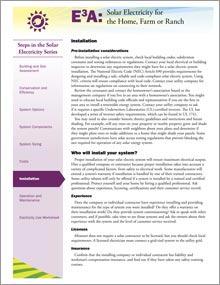
E3A Solar Electricity: Installation
Reviewed
Thinking about installing a solar electric system? Read this guide to learn what to consider — from checking local building codes to comparing bids — when selecting a solar electric system and installer.

E3A Home Energy: Storm Windows
Reviewed
Editor’s note
The following abstract describes a publication that is only available as a downloadable PDF.
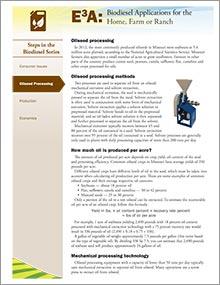
E3A Biodiesel: Oilseed Processing
Reviewed
Editor’s note
The following abstract describes a publication that is only available as a downloadable PDF.

E3A Understanding Energy: Energy Pyramid
Reviewed
Editor’s note
The following abstract describes a publication that is only available as a downloadable PDF.

E3A Home Energy: Condensation Control
Reviewed
Editor’s note
The following abstract describes a publication that is only available as a downloadable PDF.
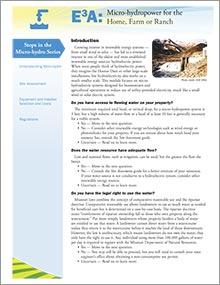
E3A Micro-hydro: Introduction
Reviewed
A micro-hydroelectric system for your home, farm or ranch can reduce your use of utility-provided electricity. Learn about the water and power needs of a micro-hydro system in this guide.
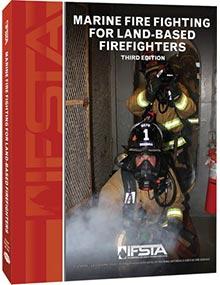
Marine Fire Fighting for Land-Based Firefighters, Third Edition Manual
New $72 to $85
The purpose of this manual is to provide land-based (shoreside) fire service personnel with the training, knowledge, technical information, and reference materials necessary for the safe and effective management of marine fire incidents. The content of this manual is written to meet the job performance requirements of NFPA 1005, the National Fire Protection Association’s Standard for Professional Qualifications for Marine Fire Fighting for Land-Based Fire Fighters, 2019 Edition.

E3A Home Energy: Attic and Ceiling Insulation
Reviewed
Editor’s note
The following abstract describes a publication that is only available as a downloadable PDF.
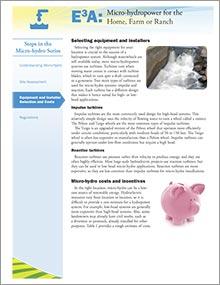
E3A Micro-hydro: Equipment and Installer Selection and Costs
Reviewed
Selecting the right equipment is crucial to the success of a hydropower system. Learn about impulse and reaction turbines, the two main types used for micro-hydro systems, in this guide.

E3A Understanding Energy: Off-Grid Living
Reviewed
Editor’s note
The following abstract describes a publication that is only available as a downloadable PDF.
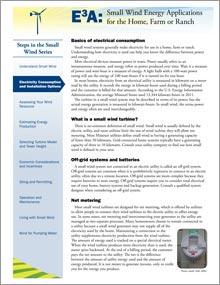
E3A Small Wind: Electricity Consumption and Installation Options
Reviewed
Editor’s note
The following abstract describes a publication that is only available as a downloadable PDF.
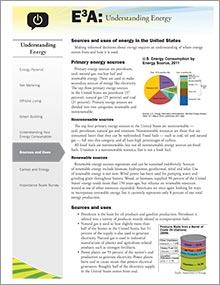
E3A Understanding Energy: Sources and Uses of Energy in the United States
Reviewed
Editor’s note
The following abstract describes a publication that is only available as a downloadable PDF.
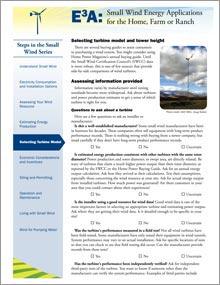
E3A Small Wind: Selecting Turbine Model and Tower Height
Reviewed
Editor’s note
The following abstract describes a publication that is only available as a downloadable PDF.
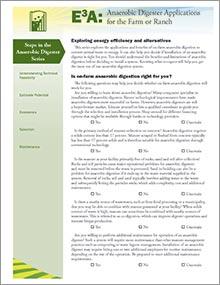
E3A Anaerobic Digesters: Introduction
Reviewed
Editor’s note
The following abstract describes a publication that is only available as a downloadable PDF.
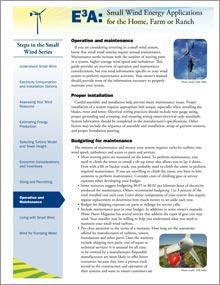
E3A Small Wind: Operation and Maintenance
Reviewed
Editor’s note
The following abstract describes a publication that is only available as a downloadable PDF.
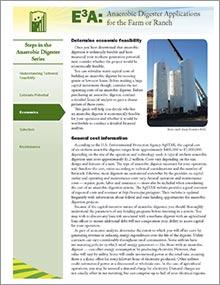
E3A Anaerobic Digesters: Economics
Reviewed
Editor’s note
The following abstract describes a publication that is only available as a downloadable PDF.
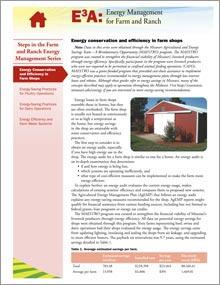
E3A Farm Energy: Energy Conservation and Efficiency in Farm Shops
Reviewed
Editor’s note
The following abstract describes a publication that is only available as a downloadable PDF.

E3A Solar Hot Water: Introduction
Reviewed
Editor’s note
The following abstract describes a publication that is only available as a downloadable PDF.
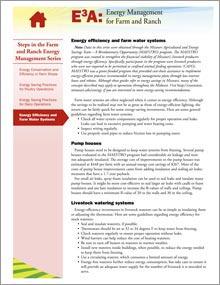
E3A Farm Energy: Energy Efficiency and Farm Water Systems
Reviewed
Editor’s note
The following abstract describes a publication that is only available as a downloadable PDF.

E3A Home Energy: Air Sealing
Reviewed
Editor’s note
The following abstract describes a publication that is only available as a downloadable PDF.

E3A Solar Hot Water: System Options
Reviewed
Editor’s note
The following abstract describes a publication that is only available as a downloadable PDF.
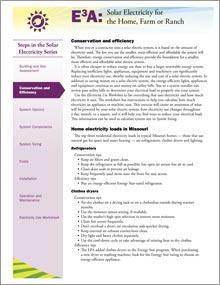
E3A Solar Electricity: Conservation and Efficiency
Reviewed
Follow these energy conservation tips to reduce your energy use so you can install a smaller, more efficient and affordable renewable energy system.

E3A Home Energy: Home Insulation Choices
Reviewed
Editor’s note
The following abstract describes a publication that is only available as a downloadable PDF.